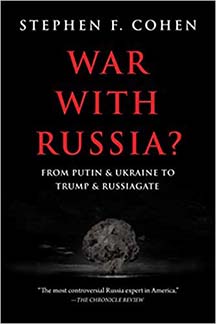By Lucy Komisar
Aug 12, 2019

Stephen Cohen‘s important, disturbing book “War With Russia?” is subtitled “From Putin & Ukraine to Trump & Russiagate.” In an era of Russophobia where the major media and politicians are conspiracy theorists, he is among the few who challenge their ignorance or deceit.
Cohen, a former Russian studies professor at Princeton and New York University and author of eight other books on Russia, writes an excellent account of the last five years of a U.S. policy that exists on the cusp of insanity. Most of the text comes from conversations he has had since 2014 with radio interviewer John Batchelor.
Cohen throughout the book rightly faults the media for missing history. He talks about the Trump Tower meeting and says:
“When it turned out that a Russian lawyer wanted to speak to Donald Trump Jr. about “orphans,” at a now infamous meeting at Trump Tower, this was derided as a laughable Russiagate cover-up. But the issue is serious both in Russia and for some in the United States. In 2012, Putin signed a bill banning future American adoptions of Russian orphans. (Thousands had been adopted by American families since the 1990s.) It was generally thought to have been Putin‘s retaliation for the US Congress‘ Magnitsky Act, which sanctioned Russian “human rights violators.”
Several other aspects of this saga are rarely, if ever, reported. One is that the account of the Magnitsky affair given by William Browder, a onetime American financial operator in Russia who spearheaded the US legislation, uncritically repeated by US media, has been seriously challenged. Another is that Putin was already, prior to the Magnitsky Act, under considerable Russian public and elite pressure to end American adoptions because several adopted children had died in the United States. Yet another is the pain of more than 40 American families who had virtually completed the formal adoption process when the ban was enacted, leaving their children stranded in Russia.
Still more, there is the possibility that Putin might enable at least some of these Russian children to come to their would-be American families as a détente concession to Trump. But similarly unreported, Putin needs a “sanctions” concession from Trump.”
So, parse that, please. This is the only part of the book where Cohen misses. In a situation where the Browder hoax has had a major impact on U.S.-Russia relations, the closest the author comes to it is:
“Several other aspects of this saga are rarely, if ever, reported. One is that the account of the Magnitsky affair given by William Browder, a onetime American financial operator in Russia who spearheaded the US legislation, uncritically repeated by US media, has been seriously challenged.”
And about the adoption ban Russian President Putin is thought to have ordered in retaliation for the Magnitsky Act which “sanctioned Russian ˜human rights violators‘.”
But what really is the Browder account of the Magnitsky affair, what is the Magnitsky Act, how are they related? Who has challenged the media on that and what did they say?
Most readers may scratch their heads. Some families who want to adopt children will care deeply about that issue, but it is not the stuff of serious foreign policy discussion. Countries do not go to war over adoption.
Cohen knows that the Browder story is fake, that Magnitsky was the tax accountant who handled his Russian tax evasion, that he got members of CongressŠ”Šclueless or with agendasŠ”Što pass the Magnitsky Act sanctioning Browder‘s enemies list, especially targeting the investigators who discovered and documented his tax cheating. I know that he agrees with the few media revelations of Browder’s corruption, including mine.
Stephen Cohen, who is a respected analyst among serious people and has been fearless in attacking America‘s foolhardy Russiagate policies, should talk about Bill Browder, his Magnitsky hoax and their horrific progeny, the Magnitsky Act.
This is an otherwise excellent book. From Hot Books, an imprint of Skyhorse Publishing, New York.

